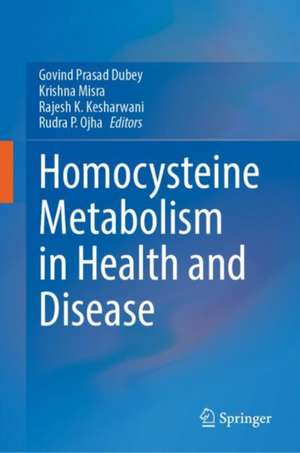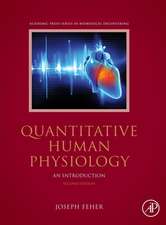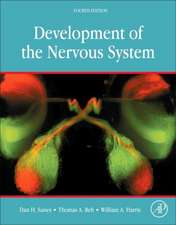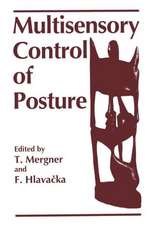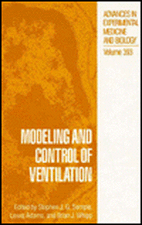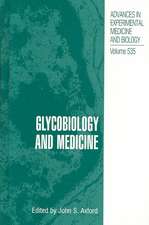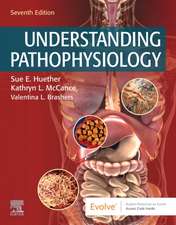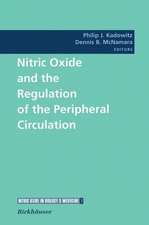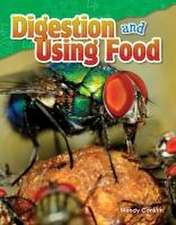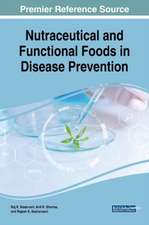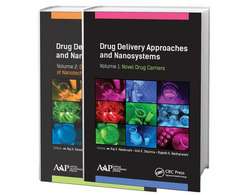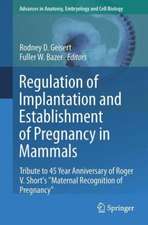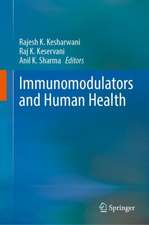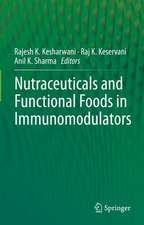Homocysteine Metabolism in Health and Disease
Editat de Govind Prasad Dubey, Krishna Misra, Rajesh K. Kesharwani, Rudra P. Ojhaen Limba Engleză Hardback – 13 mai 2022
This book comprehensively reviews the association of homocysteine metabolism with the etiology of various human disorders. The well-defined chapters embedded the central and peripheral effects of homocysteine metabolism intricately related with cardiovascular, neurodegenerative, metabolic, and autoimmune disorders. Further, it discusses the mechanisms of perturbance of cellular proteostasis by elevated homocysteine levels and provides a comprehensive account of pathophysiological consequences and clinical implications of homocysteine-containing proteins. The book also reviews association of genetic variants of homocysteine metabolic genes with type 2 diabetes mellitus and obesity. It also describes the molecular mechanism of hyperhomocysteinemia in the negative/feedback regulation of neural stem cell proliferation and alterations in DNA methylation. Taken together, it summarizes the mechanisms of hyper homocysteinemia-induced endothelial dysfunction and physiological functions of hydrogen sulfide as the protective agent.
| Toate formatele și edițiile | Preț | Express |
|---|---|---|
| Paperback (1) | 1409.89 lei 6-8 săpt. | |
| Springer Nature Singapore – 14 mai 2023 | 1409.89 lei 6-8 săpt. | |
| Hardback (1) | 1416.81 lei 6-8 săpt. | |
| Springer Nature Singapore – 13 mai 2022 | 1416.81 lei 6-8 săpt. |
Preț: 1416.81 lei
Preț vechi: 1491.38 lei
-5% Nou
Puncte Express: 2125
Preț estimativ în valută:
271.14€ • 294.42$ • 227.76£
271.14€ • 294.42$ • 227.76£
Carte tipărită la comandă
Livrare economică 22 aprilie-06 mai
Preluare comenzi: 021 569.72.76
Specificații
ISBN-13: 9789811668661
ISBN-10: 9811668663
Pagini: 276
Ilustrații: XX, 276 p. 1 illus.
Dimensiuni: 155 x 235 mm
Greutate: 0.59 kg
Ediția:1st ed. 2022
Editura: Springer Nature Singapore
Colecția Springer
Locul publicării:Singapore, Singapore
ISBN-10: 9811668663
Pagini: 276
Ilustrații: XX, 276 p. 1 illus.
Dimensiuni: 155 x 235 mm
Greutate: 0.59 kg
Ediția:1st ed. 2022
Editura: Springer Nature Singapore
Colecția Springer
Locul publicării:Singapore, Singapore
Cuprins
Module 1.- Nutrition and Health.- Module 2_Disease.- Module 3_Advanced Research.
Notă biografică
Prof. Govind Prasad Dubey is designated as a Lifelong Distinguished Professor at Department of Kriya Sharira; and has profound expertise in scientific validation of Indigenous System of Medicine. He also bears the responsibility of Study Director and Coordinator, DST Tribal Medicine Project, Institute of Medical Sciences, Banaras Hindu University, Varanasi, Uttar Pradesh. Prof. Dubey has more than 50 years of teaching, research and administrative experience and has been felicitated with various posts of International and National significance. He is distinguished member of several scientific committee including, Indian delegation led by Prime minister of India to USA. Prof. Dubey has received several International and Nation Funds/Grants including; Department of AYUSH, Department of Science and Technology (DST), Department of Biotechnology (DBT), Indian Council of Medical Research (ICMR), New Delhi and other government body in collaboration with multinational companies including; Jinvator BioMed GmbH, Germany in different areas of Herbal/Ayurveda drug development. He has published more than 250 research articles, 05 books, and holds 24 patents of USA, European and Indian continent.
Prof (Mrs.) Krishna Misra is an Honorary Professor, Indian Institute of Information Technology, Prayagraj, U.P. She superannuated as a Professor of Chemistry at University of Allahabad, where she occupied the chair of head, Biochemistry department and was first coordinator of the Centre for Biotechnology. At present, she is fellow of The National Academy of Sciences, Allahabad and also worked as General Secretary. Besides, she is chief advisor, India Pesticides Ltd., Lucknow and had been member advisory board, Biotech Park, Lucknow. She was awarded NASI Platinum Jubilee senior scientist Fellowship. She is chairperson of STEM program of DST and Chemistry advisory board of UPCST. She had been expert in many selection committees including KGMU, SGPGIMS Lucknow and is also on editorial boards of many national and international journals. She published 250 papers, four books, and has Indian and US patents to her credit. Had been member task force of Department of Biotechnology, Govt of India, Fellow and founder member of BRSI (Biotechnology Research society of India). Member advisory board, Molecular Medicine, SGPGI, Lucknow. Written a dozen book chapters presented papers in about 100 national and international conferences, has Indian and US patents, visited Japan (UNESCO fellow), U. K. (Sponsor British Council), USA (Invited papers/talks/chair) number of times to deliver lectures and participate in scientific discussions. Prof. Misra have been awarded a large no. of research projects including three prestigious international projects from USA.
Dr. Rajesh Kumar Kesharwani is an Associate Professor, Department of Computer Application, Nehru Gram Bharati, Deemed University, Prayagraj, U.P., India. He has more than 12 years of research and 9 years of teaching experience in various institutes of India. He has received several awards, including The NASI-Swarna Jayanti Puruskar by The National Academy of Sciences, of India. He has authored over 55 peer reviewed articles, 25 book chapters and 13 edited Books with international publishers. He has been a member of many scientific communities as well as a reviewer for many international journals. His research fields of interest are Medical Informatics, Protein Structure and Function Prediction, Computer-Aided Drug Designing, Herbal Drug Development, Cancer Biology, Nano-Biotechnology, and Biomedical Sciences.
Dr. Rudra Prakash Ojha is designated as Director, Research Centre and Associate Professor in department of Zoology, Faculty of Science, Nehru Gram Bharati, Deemed University, Prayagraj, U.P. India. He has more than 16 years of teaching, research and administrative experience from various National and International reputedinstitutes including; Institute of Pathology, ICMR, AIIMS-New Delhi, NIMHANS, Bangalore, Banaras Hindu University, Varanasi and University of California, Davis, CA, USA. He has authored 36 research articles, 09 book chapters and 03 edited books of National and International repute. Dr. Ojha has been conferred with various prestigious International and National awards notably; Young Scientist Award from Dept. of Science & Technology (DST), New Delhi, Full Travel support grant from Dept. of AYUSH, New Delhi for overseas presentation at World Congress of Oxygen, Club of California, Santa Barbara, California, USA. Dr. Ojha is lifetime member of many national and international societies including Society for Neurosciences (SfN), USA, Society for Free Radical Research (SFRR), Europe and Indian Academy of Neurosciences (IAN), India. His field of research interest in Herbal Drug Development, Cancer biology, Neuroscience and Biomedical Sciences.
Textul de pe ultima copertă
This book comprehensively reviews the association of homocysteine metabolism with the etiology of various human disorders. The well-defined chapters embedded the central and peripheral effects of homocysteine metabolism intricately related with cardiovascular, neurodegenerative, metabolic, and autoimmune disorders. Further, it discusses the mechanisms of perturbance of cellular proteostasis by elevated homocysteine levels and provides a comprehensive account of pathophysiological consequences and clinical implications of homocysteine-containing proteins. The book also reviews association of genetic variants of homocysteine metabolic genes with type 2 diabetes mellitus and obesity. It also describes the molecular mechanism of hyperhomocysteinemia in the negative/feedback regulation of neural stem cell proliferation and alterations in DNA methylation. Taken together, it summarizes the mechanisms of hyper homocysteinemia-induced endothelial dysfunction and physiological functions ofhydrogen sulfide as the protective agent.
Caracteristici
Presents molecular, biochemical and pathophysiological implications of hyper-homocysteinemia Discusses mechanisms associated with macro and micro-vascular disorders induced by hyper-homocysteinemia Enumerates the homocysteine etiology in metabolic and neurodegenerative disorders
